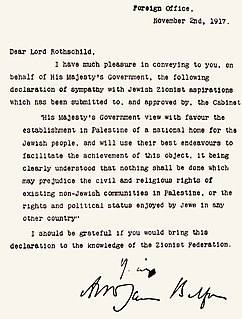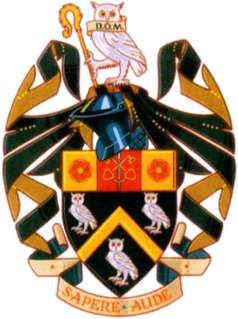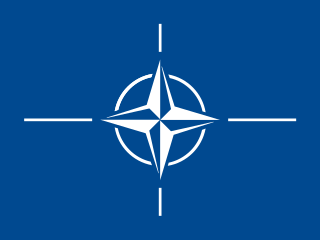
The Balfour Declaration was a public statement issued by the British government in 1917 during World War I announcing support for the establishment of a "national home for the Jewish people" in Palestine, then an Ottoman region with a small minority Jewish population. It read:
His Majesty's government view with favour the establishment in Palestine of a national home for the Jewish people, and will use their best endeavours to facilitate the achievement of this object, it being clearly understood that nothing shall be done which may prejudice the civil and religious rights of existing non-Jewish communities in Palestine, or the rights and political status enjoyed by Jews in any other country.
The Zinoviev letter was a document published by the British Daily Mail newspaper four days before the general election in 1924. It purported to be a directive from Grigory Zinoviev, the head of the Communist International (Comintern) in Moscow, to the Communist Party of Great Britain, ordering it to engage in seditious activities. It said the resumption of diplomatic relations would hasten the radicalisation of the British working class. This would have constituted a significant interference in British politics, and as a result it was deeply offensive to British voters, turning them against the Labour Party. The letter seemed authentic at the time, but most historians now agree it was a forgery. The letter aided the Conservative Party, by hastening the collapse of the Liberal Party vote that produced a Conservative landslide. A. J. P. Taylor argued that the most important impact was on the psychology of Labourites, who for years afterward blamed their defeat on foul play, thereby misunderstanding the political forces at work and postponing necessary reforms in the Labour Party.

Chaim Azriel Weizmann was a Zionist leader and Israeli statesman who served as President of the Zionist Organization and later as the first President of Israel. He was elected on 16 February 1949, and served until his death in 1952. Weizmann convinced the United States government to recognize the newly formed state of Israel.

Douglas Richard Hurd, Baron Hurd of Westwell, is a British Conservative politician who served in the governments of Margaret Thatcher and John Major from 1979 to 1995.

Ernest Bevin was a British statesman, trade union leader, and Labour politician. He co-founded and served as general secretary of the powerful Transport and General Workers' Union in the years 1922–40, and as Minister of Labour in the war-time coalition government. He succeeded in maximizing the British labour supply, for both the armed services and domestic industrial production, with a minimum of strikes and disruption. His most important role came as Foreign Secretary in the post-war Labour government, 1945–51. He gained American financial support, strongly opposed Communism, and aided in the creation of NATO. Bevin's tenure also saw the end of the Mandate of Palestine and the creation of the State of Israel. His biographer, Alan Bullock, said that Bevin "stands as the last of the line of foreign secretaries in the tradition created by Castlereagh, Canning and Palmerston in the first half of the 19th century", and that due to the reduction in British power he has no successors.

Donald Duart Maclean was a British diplomat and member of the Cambridge Five spy ring which conveyed government secrets to the Soviet Union.

Archibald Clark Kerr, 1st Baron Inverchapel, known as Sir Archibald Clark Kerr between 1935 and 1946, was a British diplomat. He served as Ambassador to the Soviet Union between 1942 and 1946 and to the United States between 1946 and 1948.

Samuel Montagu, 1st Baron Swaythling was a British banker who founded the bank of Samuel Montagu & Co. He was a philanthropist and Liberal politician who sat in the House of Commons from 1885 to 1900, and was later raised to the peerage. Montagu was a pious Orthodox Jew, and devoted himself to social services and advancing Jewish institutions.
Richard Oliver Miles CMG is a retired British Ambassador. He is a former chairman of the international business development company MEC International.

The Haavara Agreement was an agreement between Nazi Germany and Zionist German Jews signed on 25 August 1933. The agreement was finalized after three months of talks by the Zionist Federation of Germany, the Anglo-Palestine Bank and the economic authorities of Nazi Germany. It was a major factor in making possible the migration of approximately 60,000 German Jews to Palestine in 1933–1939.
Sir William Goodenough Hayter KCMG was a British diplomat, Ambassador to the Soviet Union from 1953 to 1957, later Warden of New College, Oxford, and author.

L. J. Greenberg, born Leopold Jacob Greenberg (1861–1931), was a British Jewish journalist. He had become an energetic propagandist of the new Zionism in England by the Third Zionist Congress in 1899, at which he and Jacob de Haas were elected as members of the ZO's Propaganda Committee. His frequent dialectical debates were conducted as editor of The Jewish Chronicle, the leading paper in Britain for the Jewish community. Greenberg called for decency and humanity towards World Jewry.

Israel–Netherlands relations are foreign relations between Israel and the Netherlands.

The Molotov–Ribbentrop Pact was an August 23, 1939, agreement between the Soviet Union and Nazi Germany colloquially named after Soviet foreign minister Vyacheslav Molotov and German foreign minister Joachim von Ribbentrop. The treaty renounced warfare between the two countries. In addition to stipulations of non-aggression, the treaty included a secret protocol dividing several eastern European countries between the parties.

Ivan Samylovskii (Samylovsky), was a Soviet diplomat, politician and journalist. He held the diplomatic rank of Ambassador Extraordinary and Plenipotentiary. He was also the Head of the Department of the Near East of the USSR Ministry for Foreign Affairs. In his work he specialized in China, Turkey, Afghanistan, Near and Middle East and the countries of Africa. He is historically known as a leading Soviet specialist in Soviet-Chinese relations.

Sir William Conyngham Greene, was a British diplomat who served as minister to Switzerland, Romania and Denmark, and as ambassador to Japan.

Mandatory Palestine was a geopolitical entity established between 1920 and 1923 in the region of Palestine as part of the Partition of the Ottoman Empire under the terms of the British Mandate for Palestine.

Israel Cohen was an Anglo-Jewish, Zionist leader, writer, and journalist.
Sir John Killick GCMG was a British diplomat who was ambassador in Moscow at a difficult time, later ambassador to NATO.
Francis George Kenna Gallagher, known as "Ken" to his family, was a British Foreign Office official and diplomat.


















